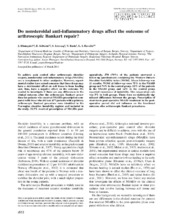Do nonsteroidal anti-inflammatory drugs affect the outcome of arthroscopic Bankart repair?
Peer reviewed, Journal article
Published version

Åpne
Permanent lenke
https://hdl.handle.net/1956/8830Utgivelsesdato
2014-04-22Metadata
Vis full innførselSamlinger
Originalversjon
https://doi.org/10.1111/sms.12233Sammendrag
To achieve pain control after arthroscopic shoulder surgery, nonsteroidal anti-inflammatory drugs (NSAIDs) are a complement to other analgesics. However, experimental studies have raised concerns that these drugs may have a detrimental effect on soft tissue-to-bone healing and, thus, have a negative effect on the outcome. We wanted to investigate if there are any differences in the clinical outcome after the arthroscopic Bankart procedure for patients who received NSAIDs prescription compared with those who did not. 477 patients with a primary arthroscopic Bankart procedure were identified in the Norwegian shoulder instability register and included in the study. 32.5% received prescription of NSAIDs post-operatively. 370 (78%) of the patients answered a follow-up questionnaire containing the Western Ontario Shoulder Instability index (WOSI). Mean follow-up was 21 months. WOSI at follow-up were 75% in the NSAID group and 74% in the control group. 12% of the patients in the NSAID group and 14% in the control group reported recurrence of instability. The reoperation rate was 5% in both groups. There were no statistically significant differences between the groups. Prescription of short-term post-operative NSAID treatment in the post-operative period did not influence on the functional outcome after arthroscopic Bankart procedures.
